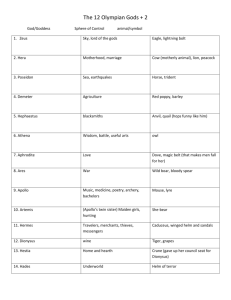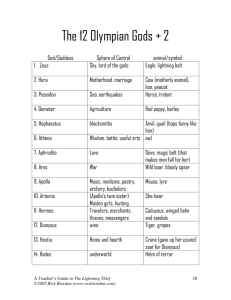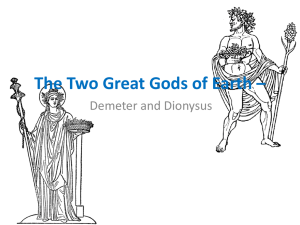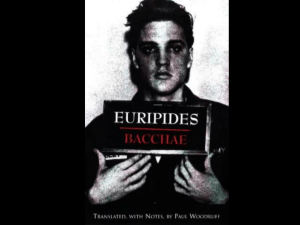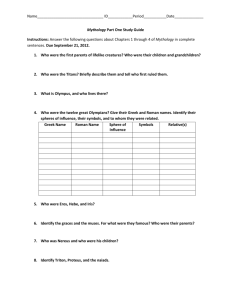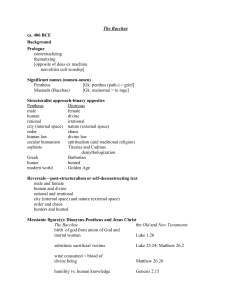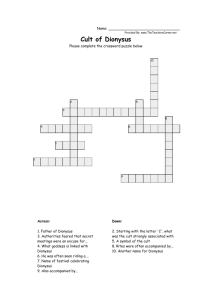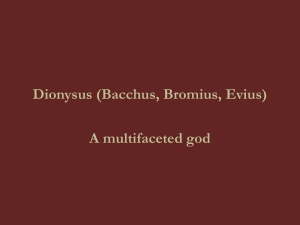Dionysus Presentation pres_dionysus1
advertisement
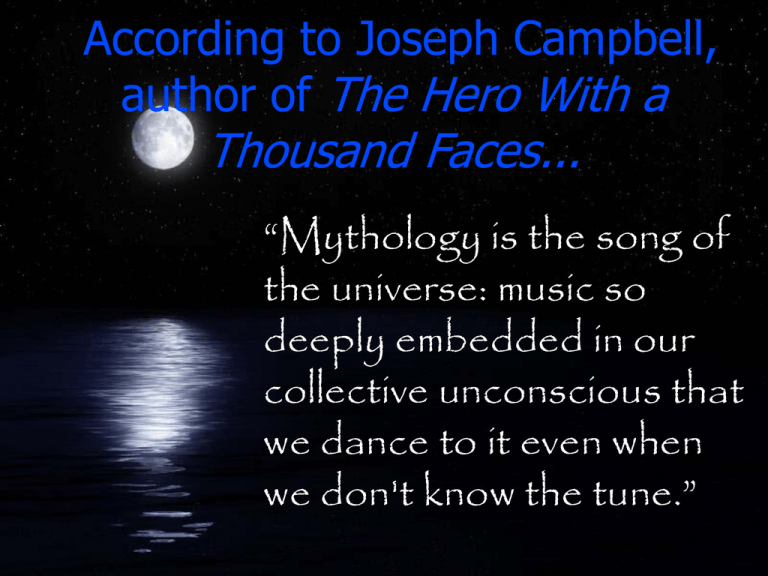
According to Joseph Campbell, author of The Hero With a Thousand Faces... • “Mythology is the song of the universe: music so deeply embedded in our collective unconscious that we dance to it even when we don't know the tune.” Dionysus Targets: You should be able to: Interpret the symbolic importance of Dionysus. Recognize and interpret allusions to this character in literature, art, and everyday life: cultural literacy. Synthesize the symbolic elements of the stories to draw the bigger picture, a.k.a.: thematic importance of the stories of Dionysus. Targets, cont. You should be able to articulate the above understandings in essay format on an assessment item such as: “Explain a theme you understand from a study of Dionysus that could benefit today's society.” Questions to Consider... Why is Dionysus considered a giver of the good gifts of earth? Explain the position of Dionysus as a suffering god? Why does this bring them closer to humanity? Explain the dual role of Dionysus as the god of joy and the god of savagery? More Questions to Consider... Explain Dionysus as a symbol of resurrection. What is the connection between Dionysus and the development of the Greek Theater? In what ways are the lessons of Dionysus still applicable in our culture today? Dionysus/Bacchus One of the most celebrated gods by the Greeks—eventually supplanted Hestia as one of the twelve Olympians The only god with a mortal parent God of irrationality, intoxication, and frenzy God of fertility He is literally the vine: wine Promoter of civilization, lawgiver, and lover of peace Terms relevant to the study of Dionysus Dionysia—Greek festival in his honor Bacchanalia—Roman festival in his honor Maenads—female followers:worshiped in the wild— forests, etc. Satyrs—half men/half goats that traveled/reveled with Dionysus Dionysians—followers of Dionysus God of Complex Duality Twice-Born Both man and animal (can appear as a bull or goat) Both male and female qualities Both young and old (can appear as a boy) Both the social and beneficent influences of wine and the violent and unpredictable properties as well Freedom and ecstatic joy and savage brutality Man's blessing and his ruin Who Said? Unmentioned by Homer or Hesiod Appeared in Greek Culture around 1250 BCE Transplant from ancient Near East (Well...maybe?) Most of what we know about the Dionysus mythology comes from Euripedes' The Bacchae (c. 407 BCE) “Mankind...possesses two Euripides said what? supreme blessings. First of these is the goddess Demeter, or Earth— whichever name you choose to call her by. It was she who gave to man his nourishment of grain.... But after her there came the sonEuripides of Semele,said who what? matched her present by inventing liquid wine as his gift to man. For filled with that good gift, suffering mankind forgets its grief; from it comes sleep with it oblivion of the troubles of the day. There is no other medicine for mercy.” Please recognize the symbolic value of Wine? the duality of the personality of Dionysus/Wine Both, in the right person/situation were considered enjoyable in the Greek culture However, in the wrong situation, in the wrong person it can be HIGHLY destructive—destroying lives, families, careers, friendships, etc. Agreed? Also, the “escapism” properties— remember Poe? Has it changed? Dionysus: The Birth Zeus came to the mortal Semele disguised in the cover of darkness She became pregnant knowing only that her baby was fathered by a god Hera Found out Zeus, madly in love, had offered Semele anything she wanted (start to take note of madness in any form, and think about it) Dionysus: The Birth Hera was jealous of pregnant Semele, so she approached her in disguise as her aged nurse Beroë (Noticing a symbolic trend? The powerful disguising themselves and manipulating the poor/naïve...my how times have changed!) Tricked Semele into asking Zeus (who must not break a promise especially when he has sworn on the river Styx) to reveal himself to her in his true form (knowing that no mortal can view an immortal in his/her true state) Dionysus: The Birth Zeus reluctantly agrees, and she instantly burned to a crisp! Dionysus was born of fire—think about that. Hermes quickly rescues Dionysus from his dying mother and Zeus stitches him into his own thigh until he is ready to be born just moments later! Hence, “twice-born” (but it comes up again—get it?) Dionysus: The Birth As with Hercules, Hera was not finished messin’ with Zeus’ baby Zeus knows his wife—he dresses the baby as a girl (gender duality )to throw her off of the trail—it doesn't work... She sent the Titans to rip baby Dionysus to 7 pieces, cook and eat him. Never fear, grandma-ma Rhea to the rescue: she put him back together, nay...resurrected him...more to follow Plus, he WAS an immortal, right? Dionysus: The Birth After Hera's stunt, sent him to live with his mortal aunt and uncle. Not good enough—Hera makes them go mad: they kill their children and themselves: filicide & suicide Zeus saves him and turns him into a goat Dionysus: The Birth Most stories indicate Zeus arranged to have him sent away to be raised by mountain Nysæan nymphs (recognize the story) Some believe they were the Hyades whom Zeus afterward placed in the sky as stars, the stars which bring rain when they near the horizon So Dionysus born of fire, nursed by rain much like the heat that ripens the grape and the water that nurtures it Well look at him go… Dionysus never knew Semele, but he felt for her He went to Hades, faced down Thanatos, Death himself, and made his mother the only mortal to be brought successfully out of Hades and delivered to Olympus Hera's torture continues... When Dionysus is returned to human form, Hera made him go mad He wandered the Eastern world until he met a goddess named Cybele (some stories Rhea), a mother goddess from Asia Minor (Phrygia) Cybele cured Dionysus of his madness and introduced him to all of her secret rites Finally coming into his own... Not much is known about Dionysus' young adulthood (sound familiar?) It is written that he wandered all over Asia teaching men the culture of the vine and the mysteries of his worship He was readily accepted and followed until... He returns home to Greece First poor fella was kidnapped, as he napped, by some greedy sailors who thought he was a lovely son of a rich man or a king Only one, Acetes, recognized in him traits of an immortal He begged them not to take Dionysus, but “so blind is the lust of gain...” He returns home to Greece Dionysus quickly requested that the ship take him to his favorite island, Naxos He promised wealth and gratitude for their service The abductors had other plans Sell him as a slave in Egypt They should have guessed there was a problem when their bonds couldn't hold him...I'll let you He returns home to Greece Suddenly the ship stalls in the water, engulfed in grape vines They notice tiger, lynxes, and panthers playing around Dionysus' feet (in some versions he himself<what type of pronoun is himself?> turns into a lion) He is holding a spear wreathed in ivy And they all started turning into... DOLPHINS! He returns home to Greece King Lycurgus was another fool who insulted Dionysus on his way through Thrace Dionysus retreated temporarily in the sea (read symbolism) But later returned, overpowered him and punished him for his wickedness(read disrespect) He returns home to Greece He imprisoned him in a rocky cave until his rage turned into understanding what he had done wrong—an immortal version of a time-out. Not enough you say... Zeus struck him blind and he died soon after Moral of the story? What happens when you disrespect the powerful? Message received? He returns home to Greece • Romantic Time-Out Theseus, who you'll read about soon, had recently abandoned a Cretan princess, Ariadne She was in his favorite city, Naxos She was beautiful and needy Dionysus took pity on her and grew to love her. He returns home to Greece • When Ariadne died, Dionysus took her crown and placed it among the stars— still known as Corona Borealis He returns home to Greece Dionysus arrives in Thebes to establish his worship there As was his tradition, a train of singing, dancing, scantily clad women mad with joy, accompanied him King Pentheus had no idea that the man bringing all of this chaos to his city was in fact his cousin— everyone figured any child of Semele's was toast along with her Thebes...the drama continues Prudish Pentheus didn't approve of all of the reveling of the Maenads and Dionysus He ordered all of the revelers arrested, especially the leader Enter the paradoxical seeing blind man...none other than the world famous Teiresias, the holy man of Thebes... Thebes...the drama continues Teiresias warned Pentheus of Dionysus' identity But because Teiresias was dressed like a Dionysian, he scoffed and blind (did you notice all of the references to sight in this chapter?) with anger spoke harshly with Dionysus—denying his immortal status Thebian prison couldn't hold Thebes...the drama continues him—duh He escaped and attempted once again to convince Pentheus to come to his way of thinking No good, Pentheus was dead-set (pardon the pun) Pentheus went to hunt down the women he objected to—they were chillin' in the hills (unbeknownst to him, his own mother and sisters were among the wild women) The most heartless, beastial, and Thebes...the drama continues destructive forces of Dionysus are unleashed in this revenge plot The women, blinded in their worship, see Pentheus and believe him to be a wild animal—a mountain lion, and they rushed on him, tore him limb from limb Pentheus, as he was attacked, is reported to have understood his crime Only after Pentheus was dead did the women see what they had done— moral of the story? If Dionysus is in fact the vine, then Communion... whenever man took to the cup, he was in fact taking Dionysus in, and therefore borrowing the divinity of the god: his courage, merriment, lack of fear of consequence, etc. Unlike any other god, he was not only outside of them—he was “in” them and the divinity as well Freeing men through drunkenness led to freeing men through inspiration, which led to... The Festival of Dionysus It happened for six days in the Spring? Symbolic? It was open to all the world; no one was imprisoned, and prisoners were released No other festival in Greece could compare: they were days of perfect peace and enjoyment The location for such joy: The Festivalwasn't of Dionysus The ceremony humble or pious, it was the performance of plays! But they were still sacred acts of worship The greatest poetry in Greece and the world was written for Dionysus who was assumed to be present— his priest had the seat of honor This notion of Dionysus as a muse for great creativity and art solidified his position as a most important immortal Some comedic plays were written The Festival of Dionysus for him, but more importantly... The first tragic plays were written for Dionysus Dionysus suffered great pain—as the vine, he is torn apart after each harvest, left alone through the winter, but... Just as he did when Hera had him torn apart soon after birth, he rises again in the spring All of this pain and harm done to him solidifies him as the tragic god. The Greeks read hope of life after The Festival of Dionysus suffering They saw Dionysus' resurrection as evidence that the soul lives on after the body dies—kind of a human perennial Since, unlike Persephone, Dionysus' only forray into the underworld was to face-down death and retrieve his mother, his resurrection was more powerful in the Eleusinian Mysteries as hope of life after death: immortality One last thought about Dionysus and the theater... If Dionysus' followers are “possessed by him” “not themselves at all” Doesn't it make sense that he would be the patron god of an art form where actors don “masks” or wear the “faces of others”? He’s kind of a big deal… Dionysus was one of the most important gods to the Greeks in everyday life for several reasons The first of which is his ability, shared only by Demeter, to suffer This suffering he endures year after year gave the Greeks a sympathy for him and made them feel that he, unlike most immortals, could understand how hard life was You’re darn right they’re all Things to Consider… important! Twice born…important? Ripped to pieces and devoured like the wine and vines at harvest…important? Resurrected…important? Sent away as a baby to be raised into manhood for his own protection…important? Lost years? Child of deception and resentment? Works Consulted Campbell, Joseph. The Hero With a Thousand Faces. New York: MJF Books, 1949. 26,81,130n, 142. Davis, Kenneth C., Don't Know Much about Mythology. New York: Harper Collins, 2005. 206-209 Hamilton, Edith. Mythology. 1942. Boston: Little, Brown and Company, 1998. 53-76. The Illustrated Bulfinch's Mythology: The Age of Fable. New York: Macmillan, 1997. 41-42, 120-124. Vandiver, Elizabeth. “Hermes and Dionysos.” Classical Mythology Part I. The Teaching Company. Course 241.
